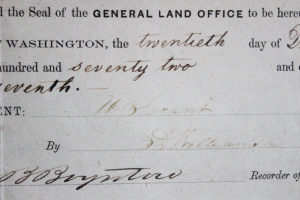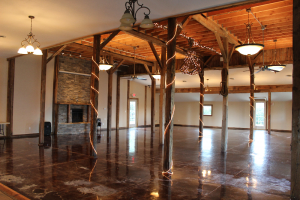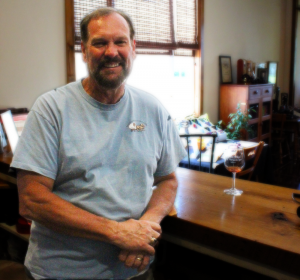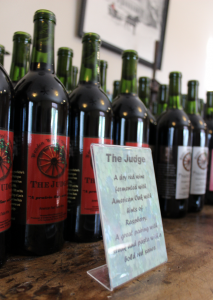The hatchwork of wooden beams which stretch across the expansive ceiling of the event center is illuminated by the ethereal glow from a dozen hanging chandeliers. Ranks of aged columns rise from the polished floor to support the mass. They are strung with countless sparkling Christmas lights which seem to instill the room with an air of enchantment and wonder. But while this image might bring to mind the luxurious great hall of some medieval lord, this room resides in the Midwest. In fact, it resides in Iowa and was painstakingly crafted around the structure of an 1860s barn. Located adjacent to the tasting room of Wooden Wheel Vineyards, it serves as a gathering place for innumerable people around the region.
“It’s fun to be a part of people’s lives when they come out here,” says Michael Vincent, winemaker and co-owner of Wooden Wheel Vineyards. “We want them not to think of this as a Marriott, we want them to think of this as just a very relaxing place where they can be just as relaxed as they are at home.”
“That’s been fun, too, the social aspect of it,” he adds. “We think we provide a valuable community service.”
Wooden Wheel Vineyards was originally the farmstead of the Vincent family whose ancestors fought in both the Revolutionary War and the War of 1812 before settling in Iowa. Pictures and original documents detailing the family history decorate the walls of the farm-turned-winery.
“I’ve always considered myself a displaced farmer,” says Vincent. “I was part of the fifth generation here on the farm, and so we always had it in the back of our minds to come back.”
Unlike the winemakers whose involvement in the industry stem from a passion for wine and winemaking, Vincent contributes the origins of Wooden Wheel Vineyards to market research and business savvy.
“I’m a business guy, and to me that’s an art,” says Vincent. “My experience has been in managing my own business or managing one for somebody else.”
Prior to Wooden Wheel, Michael Vincent and his wife owned and operated an insurance agency, which they started from scratch in 1993. It grew to include 9 offices and 18 agents in the region. When they were approached with an offer for buyout, the Vincents faced an impending decision as to what to do next. While they desired to return to the family farmstead, the realities of modern farming were readily apparent to them.
“The first thing was, we have 125 acres, obviously that’s not a farm anymore,” says Vincent. “To be a farmer anywhere it takes at least a thousand acres and really around here I’m guessing the average farm size is around three thousand acres.”
Instead, inspired by an experience they had insuring a winery, the Vincents began doing research on the possibility of starting a vineyard as an alternative for their family farm.
“We looked at the soil suitability rating from Iowa State, looked at the topography of our farm, and decided this was something we could do,” says Vincent. “You don’t need a lot of acres, especially if you’re thinking of this as something to do while you retire.”
The Vincents also decided to make their own wine, instead of limiting themselves to the sale of grapes.
“Then it becomes a value added product,” says Vincent. “We can control what we sell based on what we manufacture because we’ll produce the raw product, the grapes, and not worry about selling them or not having a market for them. Rather, we’ll be creating the market ourselves through the wine. It was a business decision.”

This family document, which hangs on the wall of the tasting room, shows the signature of Ulysses S. Grant.
After taking classes at Des Moines Area Community College under the tutelage of Randall Vos and Paul Gospodarczyk the Vincents began their own operation in 2010.
“We learned a lot that first year,” says Vincent. “Establishing the winery and going through all the hoops that takes was a lot more difficult than I anticipated.”
Zoning requirements and DNR concerns about runoff created initial hurdles to Wooden Wheel Vineyards, but eventually the doors of the winery were opened – one year later than the Vincents had planned.
Currently the estate hosts a number of varietals, including Marquette, Petite Pearl, Briana, and LaCrescent. This list is rounded out with a number of other varietals purchased from other growers.
“I’ve approached this business like I’ve approached any business and that’s from the standpoint that I don’t know everything,” says Vincent. “And I figure if I can always maintain that attitude, and I’m always asking questions, always trying to learn… then I’m still on the right direction.”
“The fun part has been learning how to make wine,” he adds. “Coming from insurance where we make paper products, [it’s fun] to actually have a tangible product which we can create and be artistic.”
That same sense of creativity is evident in the unique titles given to Wooden Wheel wines. Each is named after an ancestor. ‘Private G.W.’ refers to Michael Vincent’s great-great-grandfather George Washington Husted, who experienced the battlefield of Shiloh and the deadly Andersonville Prison during the Civil War.
While their names may exhibit a sense of playfulness, Wooden Wheel wines are serious business. After experiencing some initial challenges with the Marquette grape, Vincent employed similar processes used to produce the varietal’s ancestor, Pinot Noir, resulting in a wine which displays very similar characteristics to the classic grape and a refinement not often found in Midwestern reds.
“We don’t have any super, super sweet wines,” says Vincent. “What we try to do is accent the flavor in all those categories: the semi-sweet, the sweet and the dry.”
“Our goal has never been to win awards. Our goal has always been to make wine that people like,” he adds. “What I really enjoy is when people come in and sit down and say ‘gee, I really like all of your wines’. Then, to me, it’s been a success.”



